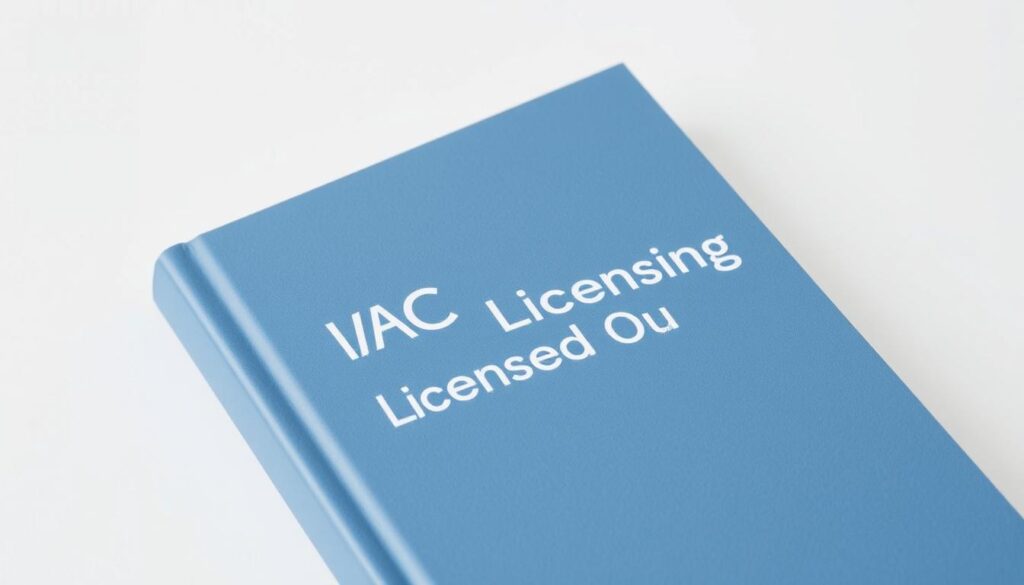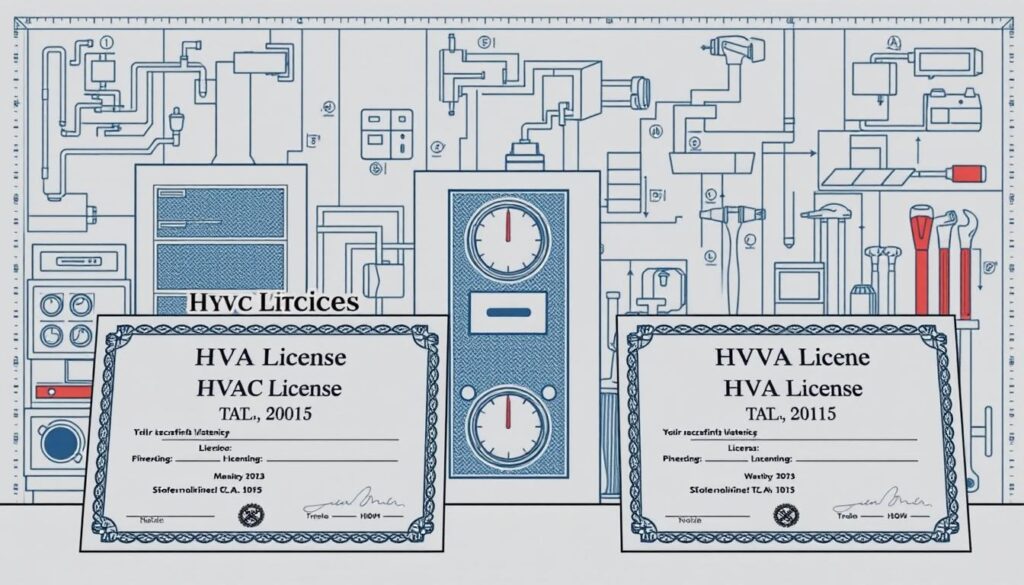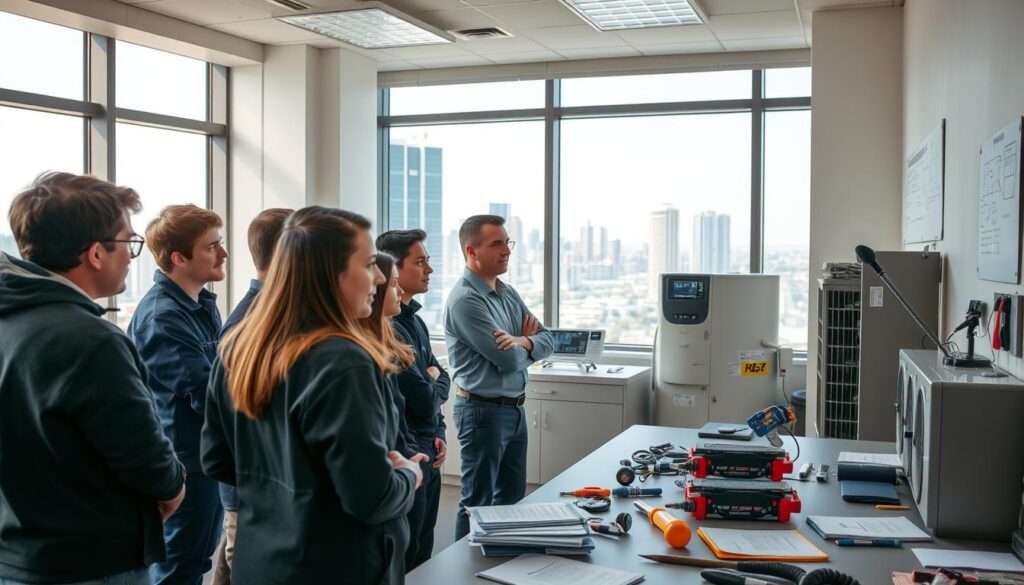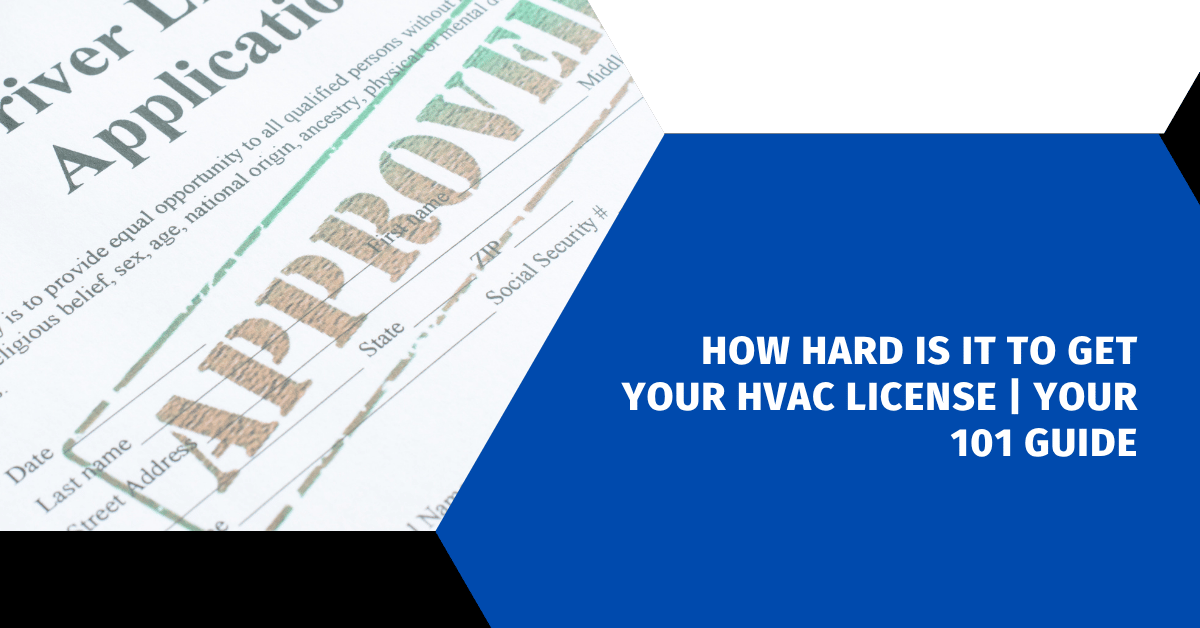Affiliate Disclosure
HVAC Guide Guys is a participant in the Amazon Services LLC Associates Program, an affiliate advertising program designed to provide a means for sites to earn advertising fees by advertising and linking to Amazon.
How Hard Is It to Get Your HVAC License? Are you curious about turning your technical skills into a career in HVAC? Getting your HVAC license seems like a tough journey. It’s filled with requirements, exams, and important steps to reach your goal.

Becoming a licensed HVAC technician is more than just knowing how things work. With over 415,800 mechanics in the field, the competition is fierce. To understand the challenge, you need to know about education, experience, and rules.
Every state has its own rules for HVAC licenses, making the process complex. Your success depends on your dedication to learning, training, and following state laws. This field is always changing, so staying up-to-date is key.
Key Takeaways
- HVAC licensing demands thorough technical and professional preparation
- State-specific requirements significantly impact the licensing process
- Educational background and work experience are vital for licensure
- Continuous learning and skill development boost your career
- Professional certifications can set you apart in the HVAC market
Table of Contents
Understanding HVAC Licensing Requirements in the United States
Getting an HVAC contractor or technician license can be tricky. Each state has its own rules. It’s key to know what your state requires.
The HVAC field is expanding fast. The U.S. Bureau of Labor Statistics says it will grow by 4% by 2029. This means getting the right license and certification is more important than ever.
State-by-State Licensing Variations
Licensing rules change a lot from state to state. For instance:
- Alabama needs 3,000 hours of work experience under a licensed contractor.
- Alaska requires contractor licensing with certain experience needs.
- Arizona asks for 4 years of HVAC experience or a mix of experience and education.
- California needs a license for any job over $500.
Basic Eligibility Criteria
Most states have similar rules for getting an HVAC license:
- You must be at least 18 years old.
- You need to finish a technical program or apprenticeship.
- You must have 2-4 years of work experience.
- You have to pass a state-specific test.
Legal Requirements for Practice
Legal rules are vital for HVAC pros. Most states need you to pass a test to work on your own. The cost can be a few hundred to several thousand dollars, depending on the state and certification.
“Proper licensing is not just a legal requirement, but a mark of professional competence and commitment to quality work.” – HVAC Industry Expert
Licensing makes sure HVAC techs meet high standards. It protects workers and customers. With the field growing by 6% and adding over 20,000 jobs by 2032, getting the right license is more critical than ever.
Explore Our HVAC Shop
Looking for top-rated HVAC tools, parts, and accessories? Visit our shop and find the perfect solution for your needs.
Visit the ShopHow Hard Is It to Get Your HVAC License
Getting your HVAC license might seem tough, but it’s doable for those serious about the field. The journey tests your technical skills, knowledge, and commitment to HVAC.
The effort needed to get an HVAC certification changes based on several things. To grasp how hard it is, look at these important points:
- Educational requirements
- Work experience
- Licensing exams
- Ongoing professional development
“Success in the HVAC industry is not about how hard the path is, but how prepared you are to navigate it.” – HVAC Professional Insider
The job market for HVAC pros is looking good. With over 415,800 mechanics in the field, and a 6% growth expected from 2022 to 2032, chances are growing. Texas is even more promising, with a 21% job growth expected.
| HVAC License Challenge | Difficulty Level | Key Requirements |
|---|---|---|
| Educational Preparation | Moderate | Technical training program |
| Work Experience | High | 48 months practical experience |
| Licensing Exam | Challenging | 70% minimum score |
Your HVAC certification needs vary by state. Usually, it includes education, experience, and passing a big exam. It’s a big investment, but the pay is worth it – with average earnings of $59,620 a year. In Texas, you could earn even more.
Remember, while the journey to becoming a licensed HVAC pro is tough, it’s a stable and fulfilling career with lots of learning opportunities.
Essential Steps to Obtain Your HVAC License
Getting an HVAC license takes planning and hard work. It’s a journey with key steps that build your career in heating, ventilation, and air conditioning.
Registration as a Technician
Your HVAC license journey starts with registration. Most states need you to:
- Have a high school diploma or GED
- Sign up with your state’s licensing board
- Fill out all needed paperwork
- Pay the first registration fees
Work Experience Requirements
HVAC apprenticeships are key for learning by doing. They last from 1 to 5 years, based on your speed and local rules. You’ll:
- Work with licensed pros
- Get verified work hours
- Gain technical skills
- Learn about safety and standards
Exam Preparation and Testing
The HVAC license exam is a big step. To prepare well, you should:
- Study HVAC technical materials
- Take practice tests
- Know about refrigeration rules
- Understand electrical and mechanical systems
“Preparation is the key to passing your HVAC license exam and launching a successful career.”
Most states want you to score at least 70% to get your license. The exam tests your technical knowledge, safety rules, and how you apply HVAC principles.
Explore Our HVAC Shop
Looking for top-rated HVAC tools, parts, and accessories? Visit our shop and find the perfect solution for your needs.
Visit the ShopTypes of HVAC Licenses and Their Scope
Understanding HVAC licensing can be tricky. There are many hvac technician licenses for different needs and skills. Knowing these options helps you pick the best career path.

- Class A HVAC Contractor License
- Class B HVAC Contractor License
- HVAC Technician License
- Specialized Refrigeration Licenses
Each hvac contractor license has its own rules and work limits. The Class A license lets you do more complex jobs. The Class B license has stricter rules.
| License Type | Exam Questions | Exam Duration | Passing Score |
|---|---|---|---|
| Class A Environmental Air | 120 questions | 230 minutes | 84 correct answers |
| Class B Environmental Air | 100 questions | 170 minutes | 70 correct answers |
| Certified Technician | 60 questions | 112 minutes | 42 correct answers |
Pro tip: Pick a license that fits your career dreams and the HVAC work you want to do.
“Choose your HVAC license strategically to unlock the right professional opportunities.” – HVAC Career Experts
Remember, each license has its own insurance needs, work experience, and area rules. Check your state’s laws to pick the best hvac technician license for your career.
HVAC License Experience Requirements and Verification
To get an HVAC license, you need to show your work experience. It’s important to know how to verify this experience. This is key for those wanting to get certified.
Documenting Work History
Your work history is very important for HVAC certification. You must document your experience well. This includes:
- Detailed project logs
- Verified work hours
- Specific job responsibilities
- Relevant HVAC apprenticeship records
Supervisor Verification Process
Employers and supervisors help prove your experience. The process usually involves:
- Detailed employment verification forms
- Signed statements from licensed professionals
- Confirmation of your job responsibilities
- Validation of hands-on work experience
Experience Exceptions and Alternatives
HVAC licensing boards accept different ways to meet experience needs:
| Experience Type | Credit Allowed |
|---|---|
| Technical Training | Up to 3 years |
| Apprenticeship Programs | Up to 3 years |
| Military Experience | Potential full credit |
| Educational Transcripts | Up to 1.5 years |
“Comprehensive documentation is the key to successfully navigating HVAC certification requirements.” – HVAC Licensing Board
Most states need at least one year of practical, hands-on experience along with any education. Keep track of your work to make the licensing process easier.
Explore Our HVAC Shop
Looking for top-rated HVAC tools, parts, and accessories? Visit our shop and find the perfect solution for your needs.
Visit the ShopHVAC Training Programs and Certification Options
Starting a career in HVAC needs careful planning and good training. HVAC programs teach you the skills and knowledge to succeed. They offer different paths to get certified and move up in your career.

When looking at hvac training programs, you’ll find several ways to learn:
- Trade School Programs (1-2 years)
- Community College Associate Degrees
- Apprenticeship Programs
- Online Certification Courses
Knowing the hvac certification requirements is key for your career. The top certifications include:
| Certification | Focus Area | Duration |
|---|---|---|
| EPA Section 608 | Refrigerant Handling | 6 Months |
| NATE Certification | Technical Expertise | 1 Year |
| HVAC Excellence | Comprehensive Skills | 2 Years |
When choosing an HVAC training program, consider these:
- Accreditation status
- Hands-on training opportunities
- Cost and financial aid options
- Preparation for industry certifications
“Invest in your education and certifications – they are the foundation of a successful HVAC career.” – Industry Expert
Most programs need a high school diploma. They also offer flexible learning to fit your schedule and learning style.
Cost Breakdown of HVAC Licensing
Getting a licensed HVAC professional job costs money. Knowing the different costs helps you plan your career better.
Getting your hvac contractor license has many expenses. Aspiring pros need to budget for these costs carefully.
Application and Registration Fees
Licensing costs change from state to state. Here are some common fees:
- Initial application fees: $50 – $525
- Written exam fees: $50 – $350
- Practical exam fees: Up to $350
- License renewal fees: $15 – $75 every three years
Insurance Requirements
Professional insurance is key for your license. Most states require certain types:
- Workers’ compensation insurance
- General liability insurance
- Professional liability coverage
“Proper insurance protects both your business and your clients,” says industry expert Mark Thompson.
Additional Certification Costs
There are extra costs for special certifications:
- EPA Section 608 certification
- Specialty trade certifications
- Continuing education courses
The HVAC industry is growing 6% nationwide. Investing in your skills can open up big career chances.
Career Opportunities and Salary
Getting an HVAC technician license can lead to great jobs and good pay. The HVAC field has many chances for those who are eager to learn and grow.
The Bureau of Labor Statistics says HVAC techs get good pay and have steady work. Here’s what you might earn:
- Median annual salary: $50,590
- Top 10% earnings: Over $80,820 per year
- Entry-level earnings: Less than $31,910 annually
With your hvac contractor license, you can move up in your career. The job outlook for HVAC pros is strong. The BLS predicts a 5% growth from 2020 to 2030, which means over 38,500 new jobs.
| Career Path | Potential Earnings | Experience Required |
|---|---|---|
| Entry-Level Technician | $31,910 – $45,000 | 0-2 years |
| Experienced Technician | $50,590 – $65,000 | 2-5 years |
| Senior HVAC Professional | $80,820+ | 5+ years |
“The HVAC industry offers stable, rewarding careers for those willing to develop their skills and expertise.” – Industry Expert
Your hvac technician license can open doors to many jobs. You could work in homes, businesses, or even start your own HVAC company. The important thing is to keep learning and stay current with new tech and standards.
Explore Our HVAC Shop
Looking for top-rated HVAC tools, parts, and accessories? Visit our shop and find the perfect solution for your needs.
Visit the ShopInsurance and Business Requirements for Licensed HVAC Contractors
Getting an HVAC contractor license means you need to know about business and insurance rules. These rules help protect your business and clients. They make sure you can work legally and safely in the HVAC field.
Most states require certain insurance for HVAC contractors. Your license will need several types of insurance:
- General liability insurance
- Workers’ compensation insurance
- Commercial auto insurance
- Contractor’s tools and equipment insurance
When it’s time to renew your HVAC license, you’ll need to keep these insurance types. For example, Texas has specific rules for different licenses:
- Class A License: Needs $300,000 per occurrence and $600,000 total for general liability
- Class B License: Needs $100,000 per occurrence and $200,000 total for general liability
“Proper insurance isn’t just a requirement—it’s your business’s safety net.”
There are also other business needs to think about:
- Business registration
- Local permits
- Performance bonds
- EPA Section 608 Technician Certification
Remember, rules can change by state. Always check local laws for your HVAC contractor license and renewal.
Conclusion
Getting your HVAC license is a big step that needs dedication and planning. You’ll go through many steps, like education and exams. These tests check your knowledge and skills.
HVAC license reciprocity opens doors to more job chances. For example, Ohio lets you work in Maine, New Hampshire, Vermont, Washington, and Oregon. This makes it easier to find work in different places.
Getting an HVAC license means always learning and improving. You’ll need to study for exams, finish your education, and keep up with training. It’s hard work, but it pays off with better pay, respect, and a secure job in HVAC.
Being a licensed HVAC pro takes hard work, skills, and following state rules. With the right strategy and focus, you can overcome the challenges. This will lead to a fulfilling career in HVAC.
FAQ
How difficult is it to obtain an HVAC license?
What are the typical requirements to get an HVAC license?
How long does it take to become a licensed HVAC technician?
What is the cost of getting an HVAC license?
How difficult is it to obtain an HVAC license?
What are the typical requirements to get an HVAC license?
How long does it take to become a licensed HVAC technician?
What is the cost of getting an HVAC license?
FAQ
How difficult is it to obtain an HVAC license?
Getting an HVAC license is tough and takes a lot of effort. You must finish your education, get lots of work experience (2-5 years), and pass tough exams. You also need to meet many technical and legal rules. It’s all about hard work, learning, and following new rules in the field.
What are the typical requirements to get an HVAC license?
To get a license, you need to be 18 or older. You must also finish a state-approved training program. Then, you need 2-5 years of work experience under a supervisor. You’ll have to pass a big exam, show you have insurance, and meet other state rules.
How long does it take to become a licensed HVAC technician?
It usually takes 3-5 years to become a licensed HVAC technician. First, you’ll study for 6-24 months. Then, you’ll work for 2-4 years under supervision. Lastly, you’ll prepare for and pass the state exam.
What is the cost of getting an HVAC license?
The cost can be from ,000 to ,000. This includes program fees (
FAQ
How difficult is it to obtain an HVAC license?
Getting an HVAC license is tough and takes a lot of effort. You must finish your education, get lots of work experience (2-5 years), and pass tough exams. You also need to meet many technical and legal rules. It’s all about hard work, learning, and following new rules in the field.
What are the typical requirements to get an HVAC license?
To get a license, you need to be 18 or older. You must also finish a state-approved training program. Then, you need 2-5 years of work experience under a supervisor. You’ll have to pass a big exam, show you have insurance, and meet other state rules.
How long does it take to become a licensed HVAC technician?
It usually takes 3-5 years to become a licensed HVAC technician. First, you’ll study for 6-24 months. Then, you’ll work for 2-4 years under supervision. Lastly, you’ll prepare for and pass the state exam.
What is the cost of getting an HVAC license?
The cost can be from $3,000 to $10,000. This includes program fees ($1,500-$5,000), exam prep ($100-$500), and exam fees ($50-$300). You’ll also need to pay for tools, insurance, and ongoing education.
Do HVAC licenses transfer between states?
License transfer rules vary by state. Some states make it easier to get a license in another state. Others require you to take the exam again or get more certifications. Always check the rules in the state you’re moving to.
What types of HVAC licenses are available?
There are many types of HVAC licenses. These include residential, commercial, contractor, and refrigeration specialist licenses. Each has its own rules and lets you do different kinds of work.
Do I need any special certifications in addition to my HVAC license?
While not always needed, extra certifications can help. The EPA Section 608 Certification is key for working with refrigerants. Other good certifications include manufacturer-specific, energy efficiency, and advanced technical ones.
What is the average salary for a licensed HVAC technician?
HVAC technicians usually make $50,000 to $85,000 a year. This depends on where you work, your skills, and experience. Contractors and those with special skills can make more.
How often do I need to renew my HVAC license?
You usually need to renew your license every 2-3 years. Renewal means paying a fee, getting continuing education (8-16 hours), and keeping your insurance and standards up to date.
What happens if I work without a proper HVAC license?
Working without a license can lead to big fines (up to $10,000) and legal trouble. You won’t be able to legally work on HVAC systems. It can even lead to criminal charges. Always make sure you have the right license before starting work.
,500-,000), exam prep (0-0), and exam fees (-0). You’ll also need to pay for tools, insurance, and ongoing education.
Do HVAC licenses transfer between states?
License transfer rules vary by state. Some states make it easier to get a license in another state. Others require you to take the exam again or get more certifications. Always check the rules in the state you’re moving to.
What types of HVAC licenses are available?
There are many types of HVAC licenses. These include residential, commercial, contractor, and refrigeration specialist licenses. Each has its own rules and lets you do different kinds of work.
Do I need any special certifications in addition to my HVAC license?
While not always needed, extra certifications can help. The EPA Section 608 Certification is key for working with refrigerants. Other good certifications include manufacturer-specific, energy efficiency, and advanced technical ones.
What is the average salary for a licensed HVAC technician?
HVAC technicians usually make ,000 to ,000 a year. This depends on where you work, your skills, and experience. Contractors and those with special skills can make more.
How often do I need to renew my HVAC license?
You usually need to renew your license every 2-3 years. Renewal means paying a fee, getting continuing education (8-16 hours), and keeping your insurance and standards up to date.
What happens if I work without a proper HVAC license?
Working without a license can lead to big fines (up to ,000) and legal trouble. You won’t be able to legally work on HVAC systems. It can even lead to criminal charges. Always make sure you have the right license before starting work.

